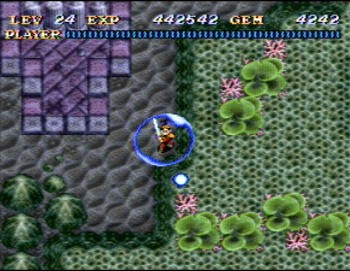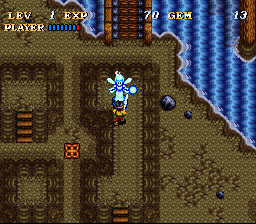|
|

|
BATTLE SYSTEM
|

|
INTERACTION
|

|
ORIGINALITY
|

|
STORY
|

|
MUSIC & SOUND
|

|
VISUALS
|

|
CHALLENGE
|
Easy to Medium
|
COMPLETION TIME
|
6-9 Hours
|
|
OVERALL
2.5/5.0
|
Rating definitions
|
|
|
Although Americans never got the Dragon Quest games that appeared on the Super Famicom, they did get a few other RPGs for the system developed by Enix studio Quintet. Among these were the first two installments of a series of very loosely-related action RPGs, the first being Soul Blazer (known as Soul Blader in Japan), which Illusion of Gaia and Terranigma followed. While Soul Blazer is certainly playable, a number of issues prevent it from being the best RPG it could possibly be.
Soul Blazer's battle system, more or less, is traditional action RPG fare, with the hero acquiring a number of swords he can use to hack away at the enemy. He can slash out or hold out his sword while moving sideways, with the former method ultimately being the better option of dealing damage. Most enemies spawn from portals known as Monster Lairs, replaced by buttons after the hero has killed enough of the type of enemy spawning from them. These buttons have many functions, such as expanding the current dungeon or unsealing part of a town or NPC to advance the story. Melee combat works out okay, although being able to move diagonally would've been nice.
 It'd be kinda hard to fight enemies without popping that bubble, wouldn't it?
It'd be kinda hard to fight enemies without popping that bubble, wouldn't it?
|
|
The hero also acquires magic, although this aspect is quite annoying, with a soul constantly circling the protagonist, and careful timing required to hit enemies. Using magic consumes gems that enemies drop. If the hero dies, he loses all his gems yet returns to the Master's sanctum with no experience lost. The hero can equip a Medical Herb to regain all his life if enemies deplete it, with the herb vanishing after its use, and the hero only able to carry one at a time. Aside from the magic system and lack of diagonal movement, the battle system serves its purpose yet could've easily been better.
The mentioned system of unsealing the game's world plays part in interaction, and the menus aren't particularly annoying, either, although it can be fairly easy at times to get lost and spend hours figuring out how to advance the game, and the translation contains quite a few flagrant errors.
The system of unsealing the world is what mainly separates Soul Blazer from other action RPGs of its time, though its storyline bears some resemblance to that of a previous Quintet title, ActRaiser, and its battle system bears typical ARPG elements. All in all, the game is moderately inventive.
The story takes place after a king hires an inventor named Dr. Leo to build a machine that could summon an evil being named Deathtoll, to whom the king brings all living beings of the world in exchange for money. You and God (or "The Master" according to the Nintendo censors) both witness this, and He sends you to the earth to right this wrong. That's pretty much the bulk of the plot there, with little meaningful character development, depth, or extended cutscenes, and rancid pacing thanks to the endless dungeon exploration. In the end, the plot's potential is wasted.
 Kill the fairy!
Kill the fairy!
|
|
Soul Blazer, moreover, is best played with the volume muted and your favorite soundtrack playing. Seriously, this is some of the worst music of the 16-bit era; it's painful to listen to. The horrific instrumentation and endless off-key notes easily ruin any potential the game's soundtrack had at all. The sound effects don't really fit, either. Overall, the aurals are easily the worst part of the game.
The game looks fine, though. The environments are pretty much believable and with fitting colors, though the sprites could've used more detail. All in all, Soul Blazer has neither the best 16-bit visuals nor the worst.
Finally, Soul Blazer's difficulty hovers somewhere between easy and medium (some bosses in particular can be challenging), and the game, depending upon whether or not you can actually figure out how to advance at times, can take anywhere from six to nine hours to complete.
Soul Blazer, ultimately, is a mediocre action RPG that would've benefited from a more polished battle system, story, visuals, and especially music. Although playing it won't hurt you at all, you wouldn't really miss much if you didn't.
Review Archives
|









